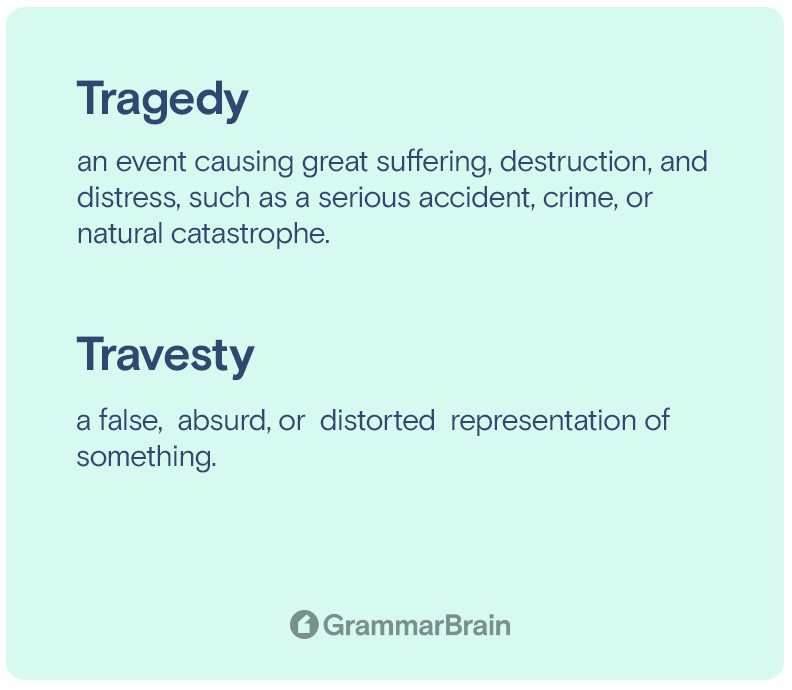Can you use travesty in place of tragedy and vice versa? These similar-sounding words are often used interchangeably. But their meanings differ vastly. Let’s examine these words in detail.
Origins of Travesty and Tragedy
Both the words travesty and tragedy originated centuries back. The noun travesty owes its origins to the French verb travestir which means “to disguise”.
The word’s roots also have connections with the Latin verb vestire which means “to clothe”. The available evidence shows that travesty came into use in the 17th century.
Tragedy comes from the Greek word tragoidia. The word tragedy was first used in the 14th century. On the basis of the available evidence, it is clear that tragedy is older than travesty.
| Word | Definition |
| Travesty | a false, absurd, or distorted representation of something. |
| Tragedy | an event causing great suffering, destruction, and distress, such as a serious accident, crime, or natural catastrophe. |
The Meaning of Tragedy and Travesty
Travesty means a distorted copy of something. This distortion is usually intentional. This distortion happens with ideas, issues or works of art.
Tragedy signifies a disastrous event or a calamity. Tragedy can also describe a serious drama that has a sorrowful end.

The Difference Between Travesty and Tragedy
Travesty is often used in a farcical tone. Travesty can denote a parody of any work of art. Some travesties can be tragic. Not all travesties are tragic. Travesties can be unhappy events. But they can also be comic as in works of art. Travesty can evoke mockery, contempt, anger, or sorrow depending on the context of its use.
Tragedy is a much more serious word than travesty. Tragedy always elicits a sorrowful and sympathetic response. Whatever the context the word tragedy is inseparably associated with sorrow.
The Similarities Between Tragedy and Travesty
There are a couple of similarities between tragedy and travesty. Both have negative connotations. Both can be used with regard to art forms like plays.
Both words evoke negative emotions. Travesty is used to denote cheap imitations of works of art. It often evokes contempt, anger, or sadness in the reader.
The very mention of tragedy evokes sorrow and pity in the reader.
The Correct Use of Tragedy and Travesty
Travesty can be used as a noun and a verb. The word tragedy is used as a noun. Some travesties can turn into tragedies. Travesty and tragedy can be used in a single sentence very effectively.
Example:
- The travesty of justice was such a tragedy.
- The travesty of truth resulted in the tragedy.
Please note that in the above example both travesty and tragedy have been used in the same sentences. This highlights the fact that the words have different meanings.
Some examples of the use of travesty in a sentence are:
- The trial looked like a travesty of justice.
- The building turned out to be a travesty of the original design.
In the above sentence using the word tragedy instead of travesty would be totally improper.
Some examples of using tragedy in a sentence are as follows:
- His son’s demise was a tragedy.
- The biggest tragedy here is that the accident happened due to his carelessness.
Using travesty instead of tragedy in the above sentences will change the meaning of these sentences.
If you are still confused about using travesty or tragedy in a sentence, you can avoid both of these words. You can use words like calamity, misfortune, or setback in place of tragedy.
Words like parody, misrepresentation, or caricature can be used instead of travesty.
Inside this article
Fact checked:
Content is rigorously reviewed by a team of qualified and experienced fact checkers. Fact checkers review articles for factual accuracy, relevance, and timeliness. Learn more.
Core lessons
Glossary
- Abstract Noun
- Accusative Case
- Anecdote
- Antonym
- Active Sentence
- Adverb
- Adjective
- Allegory
- Alliteration
- Adjective Clause
- Adjective Phrase
- Ampersand
- Anastrophe
- Adverbial Clause
- Appositive Phrase
- Clause
- Compound Adjective
- Complex Sentence
- Compound Words
- Compound Predicate
- Common Noun
- Comparative Adjective
- Comparative and Superlative
- Compound Noun
- Compound Subject
- Compound Sentence
- Copular Verb
- Collective Noun
- Colloquialism
- Conciseness
- Consonance
- Conditional
- Concrete Noun
- Conjunction
- Conjugation
- Conditional Sentence
- Comma Splice
- Correlative Conjunction
- Coordinating Conjunction
- Coordinate Adjective
- Cumulative Adjective
- Dative Case
- Determiner
- Declarative Sentence
- Declarative Statement
- Direct Object Pronoun
- Direct Object
- Diction
- Diphthong
- Dangling Modifier
- Demonstrative Pronoun
- Demonstrative Adjective
- Direct Characterization
- Definite Article
- Doublespeak
- False Dilemma Fallacy
- Future Perfect Progressive
- Future Simple
- Future Perfect Continuous
- Future Perfect
- First Conditional
- Irregular Adjective
- Irregular Verb
- Imperative Sentence
- Indefinite Article
- Intransitive Verb
- Introductory Phrase
- Indefinite Pronoun
- Indirect Characterization
- Interrogative Sentence
- Intensive Pronoun
- Inanimate Object
- Indefinite Tense
- Infinitive Phrase
- Interjection
- Intensifier
- Infinitive
- Indicative Mood
- Participle
- Parallelism
- Prepositional Phrase
- Past Simple Tense
- Past Continuous Tense
- Past Perfect Tense
- Past Progressive Tense
- Present Simple Tense
- Present Perfect Tense
- Personal Pronoun
- Personification
- Persuasive Writing
- Parallel Structure
- Phrasal Verb
- Predicate Adjective
- Predicate Nominative
- Phonetic Language
- Plural Noun
- Punctuation
- Punctuation Marks
- Preposition
- Preposition of Place
- Parts of Speech
- Possessive Adjective
- Possessive Determiner
- Possessive Case
- Possessive Noun
- Proper Adjective
- Proper Noun
- Present Participle
- Prefix
- Predicate



